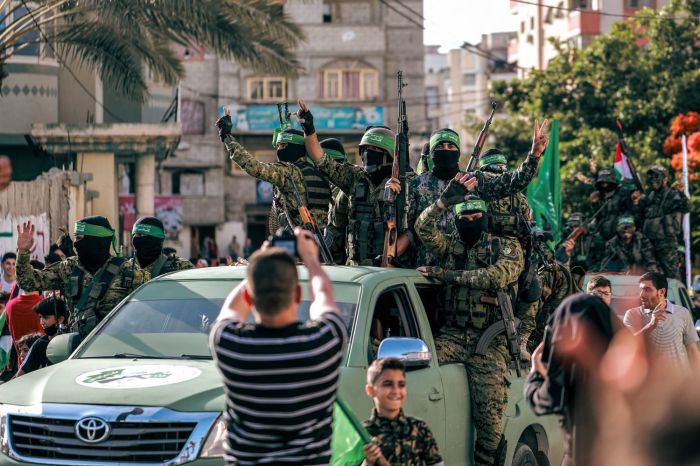
Hamas’ struggle to find money to pay its fighters following over 500 days of war with Israel shows how much the terror group relies on ideology as its primary weapon, according to a human rights expert seeking to promote positive Christian engagement with Israel.
Dominique Hoffman, an associate director for the Philos Leadership Institute, a program that educates Christian professionals about the Holy Land, highlighted the impact of Israel and President Donald Trump’s administration cutting off Hamas’ key sources of funding amid reports of financial struggles.
“But we need to remember this was never a war Hamas could win,” Hoffman told The Christian Post. “Hamas was always the weaker actor surviving on the pressure of an international anti-Israel campaign. Hamas going bankrupt is downstream of strong foreign policy.”
As The Wall Street Journal reported last week, senior Hamas fighters and political staff received only half of their pay midway through Ramadan last month. For some Gaza government employees, salary payments have ceased. Arab intelligence officials cited by the outlet stated that rank-and-file Hamas fighters had previously received a salary averaging around $200 to $300 a month.
According to Western and Arab officials, Hamas received monthly cash transfers of $15 million from Qatar before the war with Israel. The terror group, which has controlled the Gaza Strip since 2007, had also stockpiled some $500 million, money it received from other countries, but mainly from Turkey.
Israel launched a military operation in Gaza in October 2023 after Hamas slaughtered 1,200 people and abducted over 240 others during a surprise attack in southern Israel. Once the war began, Israel limited the transfer of physical cash into Gaza, as officials told WSJ, further restricting Hamas’ ability to obtain funding.
In March, Israel sealed Gaza’s borders, preventing Hamas from collecting money by selling humanitarian supplies for more than their worth to its starving population.
Other actions that impacted Hamas’ stream of income included an executive order signed by President Donald Trump earlier this year, which temporarily suspended U.S. funding to specific United Nations organizations, including the U.N. Relief and Works Agency for Palestine Refugees (UNRWA), pending a review. UNRWA has repeatedly faced scrutiny over reports that its members participated in the Oct. 7, 2023, massacre or have ties to Hamas.
In 2024, President Joe Biden’s administration suspended funding to UNRWA in response to the allegations. The Biden administration restored funding to UNRWA in 2021 after the first Trump administration cut funding to the agency in 2018.
Hoffman accused the Biden administration of emboldening Hamas, highlighting the administration’s decision in 2023 to unfreeze $6 billion of Iran’s frozen assets in South Korea.
This action benefited Hamas, an Iran-backed terror group, providing the terrorist organization with funding in the war between Israel and Gaza, Hoffman asserted.
“The Trump administration signals a stark foreign policy shift; the U.S. has returned to a policy of intolerance for terrorism and Islamism,” the policy expert told CP.
Despite the terror group’s diminishing funds, Hoffman warned the West against underestimating not only Hamas but also Iran, which is notorious for sponsoring terrorism.
“As the U.S. presses for a resolution favorable to Israel and Hamas weakens due to financial constraints, the West should not forget Hamas is not just an organization but an ideology — the latter of which will take a lot more than defunding to eliminate,” Hoffman said.
After Israel launched its military operation in Gaza to eliminate Hamas and secure the release of the hostages abducted by the terror group, a wave of anti-Israel protests erupted throughout the Western world.
On college campuses throughout the United States, protestors set up encampments, and Jewish students reported that they experienced antisemitic harassment. Legal experts and Jewish advocacy groups also responded to claims that Israel is committing genocide against Palestinians, asserting that this undermines the country’s right to defend itself and unfairly demonizes its actions.
Phillip Dolitsky, an Orthodox Jew and strategic advisor for The Philos Project, believes it is “unconscionable” for anti-Israel activists in the West to continue supporting Hamas, especially as its own people call for an end to the terror group’s rule.
In March, video footage shared online and by multiple media outlets showed thousands of Gazans taking to the streets, chanting things like “Hamas is a terrorist” and “Out, out Hamas!” Senior Hamas officials claimed that the protests were directed against Israel and the ongoing war in Gaza, but Dolitsky argued that the population there has had enough of the terror group.
“It is a brutal, dictatorial regime that not only hates Israelis but also hates even its own people who stand in the way of their genocidal aims,” Dolitsky told CP at the time, referring to the terrorist organization as the “greatest barrier to peace.”
Samantha Kamman is a reporter for The Christian Post. She can be reached at: samantha.kamman@christianpost.com. Follow her on Twitter: @Samantha_Kamman


















